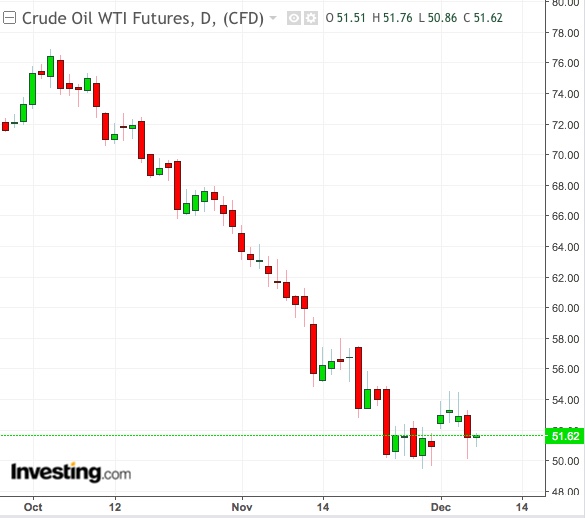When Saudi Energy Minister Khalid al-Falih leaves Vienna on Friday, he may be beset by two bigger worries than the current oil price crisis. The first is that Russia, rather than Riyadh, has become more powerful in OPEC without even being a member. The other is that with U.S. oil exports hitting record highs last week, President Donald Trump could be resort to Twitter more than ever to tell the cartel what to do.
How different the world must seem to Falih compared to six months ago when Moscow found no reason to disagree with the Kingdom on raising oil production at Trump’s behest—after 18 months of output cuts by the enlarged OPEC+ collaboration between the two countries that boosted crude prices by over 35 percent, to the U.S. president’s ire.
Fast forward to Thursday’s session and Russia’s Energy Minister Alexander Novak, prominently by Falih’s side in previous meetings on global oil market rebalancing, was conspicuously missing as the two nations struggled to find common ground to agree again on a large output cut like in 2016, so they could restore—ironically—the same 35 percent they had lost on oil prices over the past two months alone.

After High Five, Russia Stalls Saudi Plans
This time, Novak had gone home to relay to President Vladimir Putin what the latest Saudi plans were for production cuts and would return with a decision on Friday, reports said. Considering that the Russian president had high-fived Saudi Crown Prince Mohammed bin Salman before the entire world at the G20 last week, conveying the picture of continued cooperation between the two energy superpowers, which he backed up with words later, Moscow’s apparent hesitance at the 11th hour for a production cut sunk oil prices anew in Thursday’s trade.
Regardless of what OPEC decides this week, one thing seems certain: Saudi Arabia’s almost-total control over the 15-member Organization of the Petroleum Exporting Countries in the four decades since the 1973 oil embargo is over, with Russia now being able to influence what goes within the group without even being in the room.
John Kilduff, partner at New York energy hedge fund Again Capital and an OPEC watcher for the past three decades, remarked not without incredulity:
“The OPEC structure is such that everyone gets to have an equal vote. But the Russians get to have a super vote and virtual veto power.”
Not far behind is the United States, which could dictate OPEC policy as effectively as Moscow if required, with its sheer production and exports of oil both growing by the day. U.S. crude exports hit a record 3.2 million barrels per day last week, just within two years of coming out from its self-imposed four-decade old oil exports embargo. The exports ramp up came as the Louisiana Offshore Oil Port (LOOP) reached new efficiencies in pushing out crude since it was launched in February through Very Large Crude Carriers. Bloomberg reported that three VLCCs, carrying 6 million barrels of crude, will leave the LOOP this week and more are to load later this month.
Runaway U.S. Crude Exports Could Eat Into Saudi Market
Said Kilduff:
“While US shale output is predominantly light, sweet crude, there are also other middle barrel, medium grades coming out from around the country that compete more with the type of oil that the Saudis mainly export. We could be seriously poaching some of their markets with time. Already, we were a major competitor in exporting to China until the trade war got out of hand, and we could reestablish our presence there.”
Since 2016, U.S. crude output has grown by around 2 million bpd and could hit above 12 million bpd by next year as new pipeline capacities come on board, reaching well above Saudi and Russian output, which is projected to stay around 11 million barrels plus. The oil-rich state of Texas already produces 17 percent more crude than Iraq.
Aware of its growing market presence, the U.S. is strutting its weight around OPEC too, literally.
Narrative Being Taken From Saudi Hands
As surprising as Novak’s no-show with Falih on Thursday, was the breakfast meeting a day earlier in Vienna between the Saudi minister and the U.S. special representative for Iran, Brian Hook, who was believed to be carrying Trump’s reminder to OPEC that there should be no production cuts at all this time—a message the president tweeted later in the day.
That Hook and Trump were the twin forces that convinced the Saudis and Russians to raise output at the June OPEC meeting—on grounds that the United States was going to hit Iran’s oil exports with hard sanctions before the administration walked back on its tough talk, causing a sudden oversupply—wasn’t lost on the market.
Tariq Zahir, managing member at Tyche Capital Advisors, an oil-focused fund in New York, said that while Hook wasn’t in Vienna as an OPEC delegate,
“for the first time, there was a US representative at the venue of the OPEC meeting. With Qatar ready to leave OPEC and lots of rumblings of discontent within the group, along with the Khashoggi murder and its implications, it’s incredible how the narrative is being taken out of Saudi hands.”
All Fails? Pump Away!
So what will the Saudis do if their plans to cut production do not ultimately balance the market and revive oil prices?
Zahir said:
“Then it will be back to 2014—pump like crazy! That’s what they did to try and kill US shale for two straight years until the production cut deal with Russia worked. They’ll tell Trum—‘you want cheap oil, we’ll give you cheap oil.’ That’s because no Exxon (NYSE:XOM), Chevron (NYSE:CVX) or Continental (NYSE:CLR) can survive with oil in the low $20. We’ve seen enough bankruptcies at $25. The Permian basin is profitable at $40 levels. But the Bakken needs mid to high $50s.That’s the only way to defeat the US production machine.”
